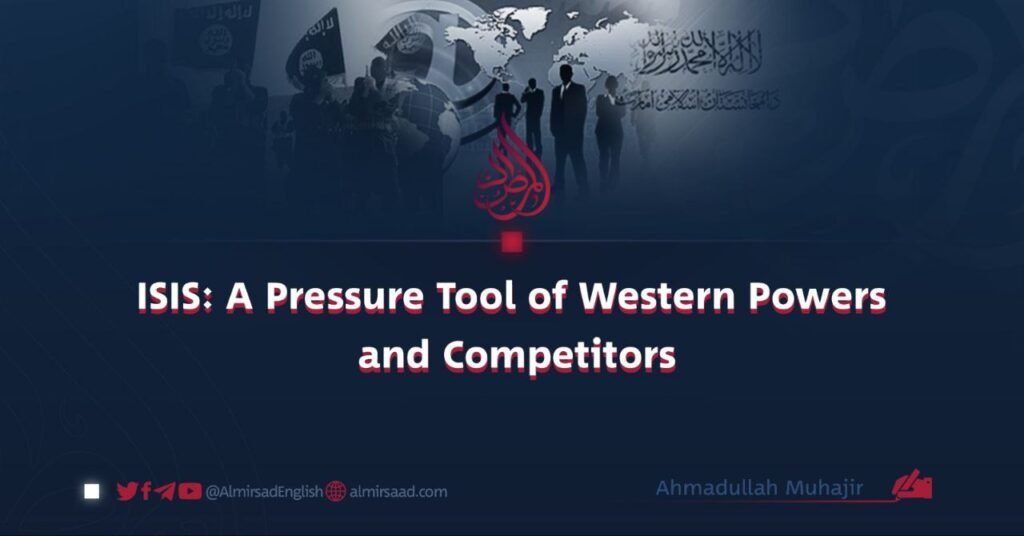ISIS: A Pressure Tool of Western Powers and Competitors
Ahmadullah Muhajir
Throughout history, the Islamic Ummah has encountered numerous challenges, to which it has consistently demonstrated resilience and perseverance.
The nation of Afghanistan, which is a part of this ummah, has witnessed numerous attacks and raids by invaders, particularly in the past century. It is evident that the adversaries have employed all possible means to subjugate and conquer this nation.
In a span of 10 years, the Soviet Red Army failed to achieve its objectives despite utilizing advanced tools and equipment. Similarly, over a period of two decades, the United States, along with its substantial material resources and support from fifty nations worldwide, was unable to assert control over this territory and its courageous populace.
To such an extent that the West, particularly the United States, took a new initiative and established a project known as “ISIS” under the guise of the “Islamic State,” which was initially deployed against the Mujahideen in Iraq. Ultimately, America cultivated this terrorist organization (ISIS) in Afghanistan with the aim of achieving its objectives.
However, Alhamdulillah, the Mujahideen recognized the adverse consequences of this group (Daesh) from the outset and took action against them until they eradicated the threat entirely.
With the establishment and achievements of the Islamic Emirate of Afghanistan (IEA), the clandestine and illicit activities of the ISIS organization, previously coordinated and supervised by the Presidential Palace (Arg) in Kabul, National Security, and Wazir Akbar Khan’s guest houses in various regions of the country, have been eliminated. Following the escape of American forces and their associates, this group has been unable to secure a refuge within Afghanistan.
Every time they lifted their heads with determination to succeed, they were promptly attacked and subsequently fell into the pit of destruction. Ultimately, they were compelled to flee and seek refuge in the embrace of their forefathers.
After the establishment of the Islamic Emirate in Afghanistan, the operational base of the aforementioned group, ISIS, was relocated to Balochistan, Pakistan and to other nations such as Tajikistan.
It has been observed that Pakistan, America, and Tajikistan have utilized this group as a tool against their adversaries. The Russian Foreign Minister articulated his astonishment following an ISIS attack on a civilian concert, stating, “Remarkably, ISIS exclusively targets adversaries of America.” Numerous pieces of evidence indicate that this group is a creation of Western powers and is involved in combatting the foes of America and the West.
Even Turkish President Recep Tayyip Erdoğan has stated that he possesses compelling evidence indicating that the United States has procured weapons for the group known as ISIS in various locations, transferring them to secure locations. Furthermore, injured individuals affiliated with ISIS have been transported to medical facilities for treatment under the supervision of American authorities.
Presently, ISIS has sought refuge in Pakistan and poses a threat to Afghanistan from within Pakistan’s borders.
An article featured in Al-Mirsaad media asserts that Pakistan’s amicable ties with the Khorasan branch of Daesh are an established reality that cannot be disregarded. Pakistan’s support for Daesh serves two purposes: first, to portray Afghanistan as an unsafe environment, and second, to exert pressure on the Islamic Emirate and its leaders by suggesting that ISIS could potentially be utilized as a weapon.
In this regard, the former interim Prime Minister of Pakistan, Anwarul Haq Kakar, publicly questioned how the government in Kabul would react if Islamabad were to provide shelter or assistance to ISIS.
It is indeed perplexing when a nation openly acknowledges the presence of terrorist elements within its borders, offering protection to such entities, yet deflecting blame onto others.
Pakistan is disseminating rumors at the international and global level that Afghanistan is a haven for terrorists, posing a threat to the region and the world.
While Pakistan itself has become a breeding ground for terrorists, they choose to accuse Afghanistan.
However, in the last four decades, it has been demonstrated that terrorists are being trained in Pakistan.
Presently, Afghanistan poses no threat to any nation, refrains from meddling in the internal affairs of other nations, and anticipates reciprocal behavior from others.
The Islamic Emirate of Afghanistan (IEA) has repeatedly emphasized that Afghan territory does not pose a threat to any nation. It will not permit the use of its land against other countries, nor will it allow any entity to exploit its territory for personal gain or to disrupt security. No nation should act in a manner that goes against Afghanistan’s interests or subjects it to pressure.
